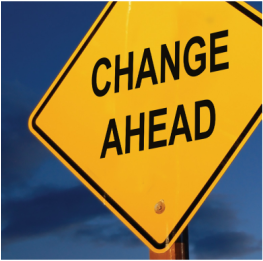
Life circumstances and situations are constantly changing. Fear arises and then passes. Joyful moments occur and then dissipate. Loss appears and then success opens up. Life is continually in motion. The movie "Groundhog Day" is merely a comedic commentary on the illusions we tell ourselves about our day to day lives. Each day, each moment harbours new potential. We are here to experience life and the full expression of emotions. In so doing, we discover who we truly are and what we like and don't like. We discover our power to create individually and together as a whole. To label a challenge as good or bad, limits the possibilities of that challenge. We may not have the ability to prevent change or to alter a situation, but we do have the power to control our perspectives, responses and intentions towards a situation. We are responsible for our lives and the energy that we send out to the world. No one or thing can take that away from us unless we allow it.
So next time something challenging comes your way, take a moment to breath and refrain from labeling it good or bad. Proceed to re-frame it in a more neutral light with the expression - We'll see...
This is best illustrated with the following Zen story of the farmer and his horse:
The story takes place in Japan in an era when a horse was a measure of wealth.
A farmer acquired his very first horse and all the local villagers came by to congratulate him.
"How proud you must be to own such a valuable horse." they all said.
The farmer smiled and said, "We'll see."
Soon afterward, the horse broke out of the paddock and ran into the countryside.
"What a terrible tragedy! What a great loss! How is it possible to recover such a thing?", the villagers lamented.
The farmer simply smiled and said, "We'll see."
Less than a week passed, and the farmer woke to find that the horse had returned accompanied by two wild horses. With the greatest of ease, he led them into the paddock and closed the gate.
"What amazing fortune! Who could of believed it was possible?", the villagers shouted.
The farmer's only response was, "We'll see."
The farmer's son worked on breaking in the horses. During one session he was thrown from the horse and broke his leg. This happened shortly before harvest when the farmer was in need of his son's help with the crops.
"What a great misfortune losing your son's help at this time!", the villagers sympathized.
"We'll see." was all the farmer said.
A few days later the Imperial Army sent troops to every village collected able-bodied young men as recruits. The Emperor had decided to go to war. The farmer's son with his broken leg, was excused from service.
And so the story goes on....
Isn't it so much better to avoid the melodrama of a situation, the labels of good or bad and just simply do what is required in the moment and chant "We'll see." Life is a roller coaster but it is always moving forward. Even in the seemingly worst circumstances, there are always fresh opportunities. You can choose to ride life's roller coaster holding on tight with fear and drama or choose to raise your hands in the air and go with the flow.
I prefer the adventure of "We'll see.".
So next time something challenging comes your way, take a moment to breath and refrain from labeling it good or bad. Proceed to re-frame it in a more neutral light with the expression - We'll see...
This is best illustrated with the following Zen story of the farmer and his horse:
The story takes place in Japan in an era when a horse was a measure of wealth.
A farmer acquired his very first horse and all the local villagers came by to congratulate him.
"How proud you must be to own such a valuable horse." they all said.
The farmer smiled and said, "We'll see."
Soon afterward, the horse broke out of the paddock and ran into the countryside.
"What a terrible tragedy! What a great loss! How is it possible to recover such a thing?", the villagers lamented.
The farmer simply smiled and said, "We'll see."
Less than a week passed, and the farmer woke to find that the horse had returned accompanied by two wild horses. With the greatest of ease, he led them into the paddock and closed the gate.
"What amazing fortune! Who could of believed it was possible?", the villagers shouted.
The farmer's only response was, "We'll see."
The farmer's son worked on breaking in the horses. During one session he was thrown from the horse and broke his leg. This happened shortly before harvest when the farmer was in need of his son's help with the crops.
"What a great misfortune losing your son's help at this time!", the villagers sympathized.
"We'll see." was all the farmer said.
A few days later the Imperial Army sent troops to every village collected able-bodied young men as recruits. The Emperor had decided to go to war. The farmer's son with his broken leg, was excused from service.
And so the story goes on....
Isn't it so much better to avoid the melodrama of a situation, the labels of good or bad and just simply do what is required in the moment and chant "We'll see." Life is a roller coaster but it is always moving forward. Even in the seemingly worst circumstances, there are always fresh opportunities. You can choose to ride life's roller coaster holding on tight with fear and drama or choose to raise your hands in the air and go with the flow.
I prefer the adventure of "We'll see.".
 RSS Feed
RSS Feed